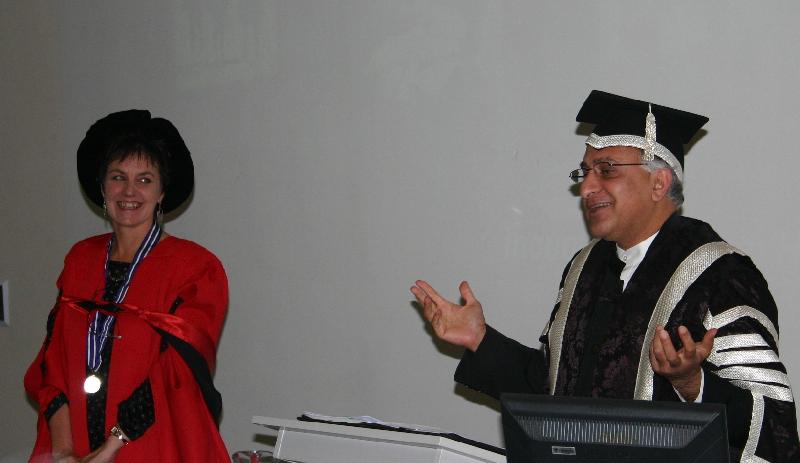
Heila Lotz-Sisitka spoke on the topic of Participation in Education at her inaugural lecture last week, where the status of Full Professor was conferred upon her.
As detailed in her Introduction by the Vice Chancellor, Dr Saleem Badat, Lotz-Sisitka was born in Johannesburg, but grew up in Port Elizabeth, on a 'creative building site' with an engineer father and an artist mother. By the age of 7, she had decided to become a teacher, and did not waver in this ambition, graduating from the University of Port Elizabeth with a first class BPrim.Ed and B.Ed (Hons).
Lotz-Sisitka became politically active at university, but it was in her first year of teaching Grade 1's that the true gross inequalities of the apartheid education system became apparent to her, as she volunteered her time to teach less privileged children in local schools.
This prompted her return to study, and she graduated in 1996 from Stellenbosch with a PhD in Environmental Education. A time of great change in South Africa, Lotz-Sisitka was heavily involved in transformation in education from the early 1990s. In 1997 she joined Rhodes University, and in 2000 was appointed to the Murray & Roberts Chair of Environmental Education and Sustainability at Rhodes University, the only such Chair in Africa.
Lotz-Sisitka has led and supported various local environmental initiatives in Makana and surrounds; she received the Vice Chancellor's Distinguished Teaching Award in 2008, and her inaugural lecture was extremely well attended, with prolonged applause following the introduction. Lotz-Sisitka immediately caused a ripple of amusement as she asked the audience for permission to remove her academic cap.
On a more serious note, she told us that, “I am here because of those who came before me” as she thanked, among others, her partner and her mother, who were present, and her university mentor and deceased father. She then contextualised her background in environmental education for the audience, describing how, after the Earth Summit in 1992, it became a new, and rapidly growing, curriculum area, and how it is inextricably intertwined with the history of the late twentieth century.
The world is rapidly losing biodiversity, and resources are being used faster than the Earth can replace them. The pollution of the Raba River in Hungary this past week brings home what level of threat we are under. “As things stand,” says Lotz-Sisitka, “We are leaving a degraded planet for our children”. And it is these children whose education she is concerned for. Why and how we learn and educate is, she says, worth discussing.
Education is primarily a modern invention. Designed to benefit the middle and elite classes, it has not been kind to the poor. Modern education can be empowering to those who can access it; it can also solidify patterns of inequality and prevent wider and new forms of reasoning and acting. In this age of commodity, our education systems do not support forms of agency such as making, growing or, indeed, doing without in the interests of the common good.
The United Nations recently declared a Decade of Education for Sustainable Development, and the task now is how education needs to be reconstituted to deal with a changing world. An education framework which takes the lead in radical changes is needed. To re-orientate society towards sustainability, we also have to look at access to education, and to retention of children in the system.
In South Africa we have an enrolment rate of approximately 93%, but the retention is a different story, with enrolment dropping to closer to 60% by high school level. As Lotz-Sisitka explains, access to education is easy for children who grow up in homes where books are available and read to them, where adults explain symbolic practices to them, and where the fit between school and home is relatively seamless. This is not the experience of all children.
Cultural differences, language differences and lack of access to the material and cultural tools of education lead to children who do not stay in education – schools are failing to serve these children adequately. Learning opportunities are not being created, and still the system is not operating within the cultural framework of the majority of its learners.
Lotz-Sisitka acknowledges that this social critique is important, but emphasises that it is only part of the required response. The vital thing is reconstruction and developing the capacity to imagine a new and different future. Instead of merely being critical, social learning programmes are helping schools and communities to tackle their problems, creating sustainable learning practices.
Lotz-Sisitka finished her inaugural lecture with the following statement: “At a broad societal and systematic level, and at the micro level of praxis, we must change our ways of participating in education if we want a more just and sustainable world order. This is the pathway that lies open before us.”
